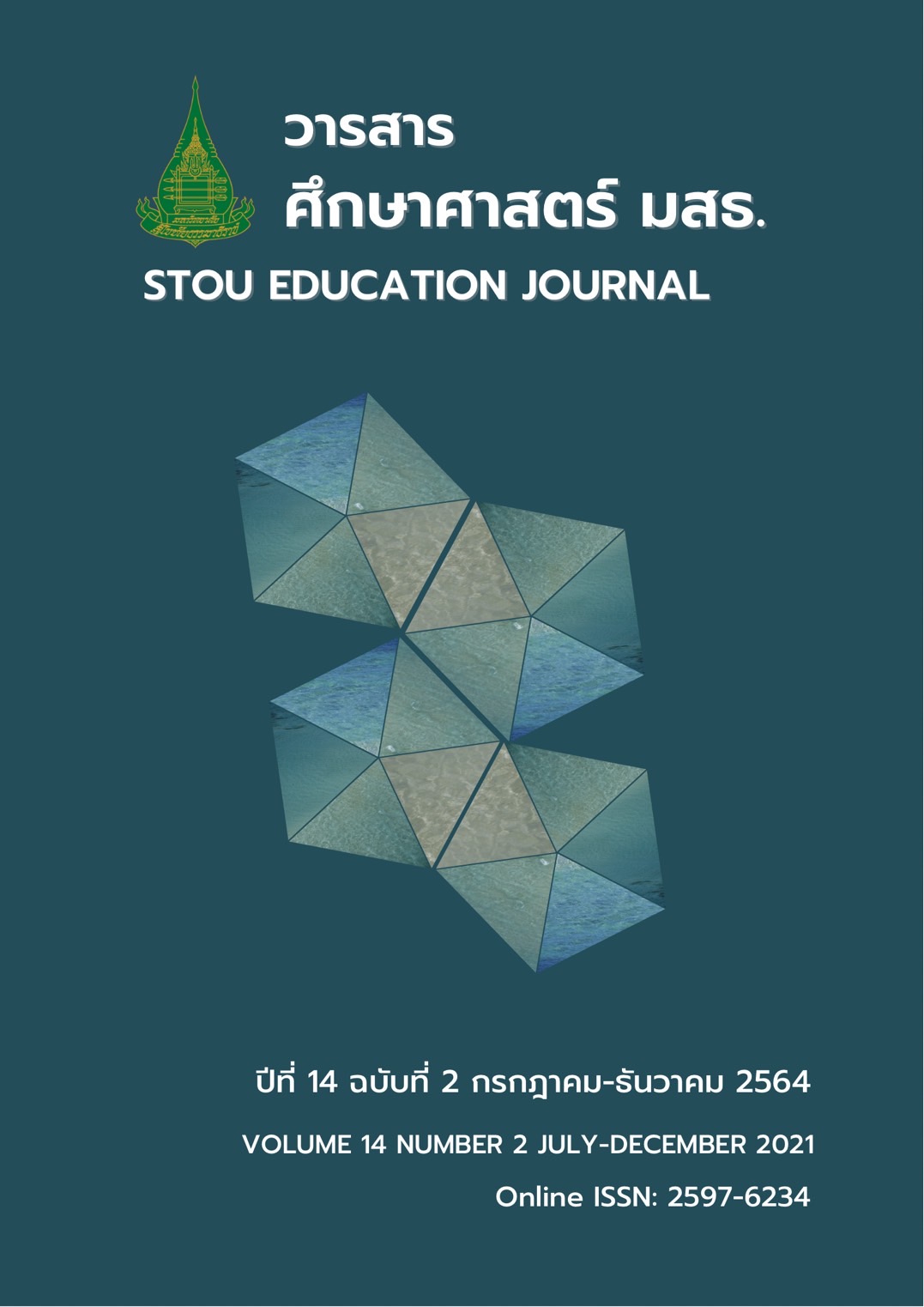The Role of Counselor for Promoting Character Strengths of Job Burnout University Lecturers
Main Article Content
Abstract
This academic article aims to present the counselor's role in promoting character strengths to job burnout university lecturers. Character strengths, derived from positive psychology, are the positive aspects of an individual's inner personality that can help reduce job burnout. They can create work satisfaction, happiness, engagement, job appreciation, and meaningful life. Therefore, it is essential to promote character strengths to persons with job burnout, particularly university lecturers. This paper describes the concepts of job burnout, character strengths, and how to conduct counseling to promote character strengths and reduce job burnout. The counselor’s role for job burnout university lecturers is to encourage the clients to recognize their character strengths through an 8-step process together with various techniques, namely strength memories, strength journal, strength cards, wheel of life, taking in the good, the hope chest, and mindfulness exercises.
Article Details
References
กอเกษ ต่ายเกิด, ครองขวัญ รั้วมั่น, นิรุชา ปรีชาเลิศศิลป์, วินิทรา นวลละออง และปนัดดา โรจน์พิบูลสถิตย์. (2562). ความชุกและปัจจัยที่เกี่ยวข้องของภาวะหมดไฟ (Burnout syndrome) ในนักศึกษาแพทย์ ระดับชั้นพรีคลินิก มหาวิทยาลัยธรรมศาสตร์. ธรรมศาสตร์เวชสาร, 19, 127-138.
แก้วกานต์ แก้วโกมล และทิพทินนา สมุนทรานนท์. (2562). ความสัมพันธ์ระหว่างบุคลิกภาพห้าองค์ประกอบ ความสามารถในการกลับคืนสู่สภาพเดิมกับภาวะหมดไฟในการทำงานของพนักงานระดับปฏิบัติการ บริษัทธุรกิจพลังงานแห่งหนึ่ง. วารสารวิจัยมหาวิทยาลัยขอนแก่น (ฉบับบัณฑิตศึกษา) สาขามนุษยศาสตร์ และสังคมศาสตร์, 7(1), 141-153.
จิตราภา กุณฑลบุตร, ฉันทนา สุรัสวดี, สุบัน บัวขาว, สุไม บิลไบ, อนันตกุล อินทรผดุง, กาญจนา จินดานิล, อุมาพร ยุวชิต, ศรุดา นิติวรการ และ อะเคื้อ กุลประสูติดิลก. (2562). การศึกษาปัญหาอุปสรรคและ แนวทางการพัฒนาอาจารย์เข้าสู่ตำแหน่งทางวิชาการของมหาวิทยาลัยราชภัฏพระนคร. วารสารวิชาการ มหาวิทยาลัยราชภัฏพระนคร, 10(1), 1-12.
จุฑารัตน์ แซ่ล้อ และ สมใจ พุทธาพิทักษ์ผล. (2560). ปัจจัยที่มีอิทธิพลต่อความเหนื่อยหน่ายในงานของพยาบาล วิชาชีพโรงพยาบาลสุราษฎร์ธานี. วารสารพยาบาลตำรวจ, 9(2), 95-103.
เจษฎา คูงามมาก และ พาชิตชนัต ศิริพานิช. (2557). ความเครียดในการทำงานของอาจารย์มหาวิทยาลัยรัฐ. วารสารพัฒนบริหารศาสตร์, 54(1), 259-285.
ทิวาวรรณ ศรีสวัสดิ์ และ ปริญญา เรืองทิพย์. (2564). ความสัมพันธ์เชิงสาเหตุของสภาวะหมดไฟและปัจจัยภายใน ที่ส่งผลต่อประสิทธิภาพในการปฏิบัติงานของบุคลากร มหาวิทยาลัยบูรพา. วารสารบริหารธุรกิจและ การบัญชี มหาวิทยาลัยขอนแก่น, 5(1), 151-166.
นฤมล สุธีรวุฒิ. (2558). ภาวะหมดไฟ: ปัจจัยที่เกี่ยวข้องและแนวทางในการป้องกัน. วารสารการวัดผล การศึกษา, 32(91), 16-25.
ปทุมรัตน์ สกุลพิมลรัตน์. (2556). ภาวะหมดไฟในการทำงานของพนักงานระดับปฏิบัติการบริษัทวีรับเบอร์ คอร์ปอเรชั่น จำกัด. (การศึกษาค้นคว้าอิสระศิลปศาสตรมหาบัณฑิต ไม่ได้ตีพิมพ์). มหาวิทยาลัยศิลปากร, นครปฐม.
พรรณราย ทรัพยะประภา. (2557). จิตวิทยาในการจัดการกับความเหนื่อยหน่ายและความเครียดในการทำงาน. วารสารสุขภาพกับการจัดการสุขภาพ, 1(1), 24-39.
มะลิสา คล่องแคล่ว, พงศ์เทพ จิระโร และ ภัคณัฏฐ์ สมพงษ์ธรรม. (2564). โมเดลความสัมพันธ์เชิงสาเหตุของ ปัจจัยที่ส่งผลต่อภาวะหมดไฟในการทำงานของครู. วารสารพัฒนาเทคนิคศึกษา มหาวิทยาลัยเทคโนโลยี พระจอมเกล้าพระนครเหนือ, 33(117), 90-96.
วิชิต สุรัตน์เรืองชัย, ฉลอง ทับศรี, ลัดดา ศุขปรีดี, มนตรี แย้มกสิกร, อนงค์ วิเศษณ์สุวรรณ, สุจินดา ม่วงมี, ปริญญา ทองสอน, อาพันธ์ชนิต เจนจิต และ ระพินทร์ ฉายวิมล (2549). การศึกษาสภาพและปัญหา การจัดการเรียนการสอนของคณาจารย์มหาวิทยาลัยบูรพา. วารสารศึกษาศาสตร์, 17(2), 105-118.
ศรัณย์ พิมพ์ทอง. (2557). คุณลักษณะที่เป็นจุดแข็ง: แนวคิด การวัด และแนวทางการพัฒนา,วารสารพฤติกรรม ศาสตร์, 20(2), 188-205.
ศรัณย์ ศรีคำ, วิโรจน์ เจียมจรัสรังสี และ เดชา ลลิตอนันต์พงษ์. (2557). ภาวะเหนื่อยล้าในการทำงานและปัจจัย ที่เกี่ยวข้องของแพทย์ประจำบ้านโรงพยาบาลจุฬาลงกรณ์. วารสารสมาคมจิตแพทย์แห่งประเทศไทย, 59(2), 139-150.
สุดารัตน์ ตันติวิวัทน์. (2560). จิตวิทยาเชิงบวก: การพัฒนา การประยุกต์ และความท้าทาย. วารสารพฤติกรรม ศาสตร์เพื่อการพัฒนา, 9(1), 277-290.
อิษฎา เจตินัย, รังสิมา หอมเศรษฐี และ มณฑิรา จารุเพ็ง. (2563). ปัจจัยทางจิตวิทยาที่ส่งผลต่อภาวะหมดไฟ ในการทำงานของพนักงานการเคหะแห่งชาติ. วารสารศิลปศาสตร์ประยุกต์, 13(1), 12-25.
Allan, B. A., Owens, R. L. & Douglass, R. P. (2019). Character strengths in counselors: Relations with meaningful work and burnout. Journal of Career Assessment, 27(1), 151-166.
Brdar, I. & Kashdan, T. B. (2010). Character strengths and well-being in Croatia: An empirical investigation of
structure and correlates. Journal of Research in Personality, 44, 151–154.
Costa P.T. & McCrae, R.R. (1992). The neo personality inventory and neo five-factor inventory: Professional manual. Odessa: PAR.
Faisal, F., Noor, N. & Khair, A. (2019). Causes and consequences of workplace stress among Pakistan University Teachers. Bulletin of Education and Research, 41(3), 45-60.
Freudenberger, H. J. (1974). Staff burn-out. Journal of Social Issues, 30(1), 159-165.
Harzer, C. & Ruch, W. (2013). The application of signature character strengths and positive experiences at work. Journal of Happiness Studies, 14, 965-983.
Kataoka, M., Ozawa, K., Tomotake, M., Tanioka, T. & King, B. (2014). Occupational stress and its related factors among University Teachers in Japan. Health, 6(5), 299-305.
Lei, W., Li, J., Li, Y., Castaño, G., Yang, M. & Zou, B. (2021). The boundary conditions under which teaching–research conflict leads to university teachers’ job burnout. Studies in Higher Education, 46(2), 406-422.
Lian L., Guo S., Wang, Q., Hu, L., Yang, X. & Li, X. (2021). Calling, character strengths, career identity, and job burnout in young Chinese university teachers: A chain-mediating model. Children and Youth Services Review, 120, 1-7.
Maslach, C., & Jackson, S.E. (1981). The measurement of experienced burnout. Journal of Occupational Behavior, 2, 99–113.
Maslach, C., & Leiter, M. (1999). Burnout and engagement in the workplace: A contextual analysis. Advance in Motivation and Achievement, 11, 275–302.
Niemiec, R. M., Rashid, T. & Spinella, M. (2012). Strong mindfulness: Integrating mindfulness and character strengths. Journal of Mental Health Counseling, 34(3), 240-253.
Peterson, C. & Seligman, M. E. P. (2004). Character strengths and virtues: A handbook and classification. New York: Oxford University Press.
Prover, R. T., Gander, F., Wellenzohn, S. & Ruch, W. (2015). Strengths-based positive psychology interventions
: A randomized placebo-controlled online trial on long-term effects for a signature strengths-vs. a lesser
strengths-intervention. Frontiers in Psychology, 6(456), 1-14.
Rashid & Seligman. (2019). Positive psychotherapy. New York: Oxford University Press.
Selvam S.G. (2015). Positive psychology’s character strengths in addiction-spirituality research: A qualitative systematic literature review. The Qualitative Report, 20(4), 376-405.
Smith, E. J. (2014). Strengths-based therapy: Connecting theory, practice, and skills. USA: SAGE
Publications, Inc.
Smith, M., Segal, J. & Robinson, L. (2021, June 19). Burnout prevention and treatment. Retrieved from
Burnout Prevention and Treatment-HelpGuide.org
Sun, W., Wu, H. & Wang, L. (2011). Occupational stress and its related factors among University Teachers in China. Journal of Occupation Health, 53(4), 280-286.
Xu, L. (2019). Teacher–researcher role conflict and burnout among Chinese University Teachers: A job demand- resources model perspective. Studies in Higher Education, 44(6), 903-919.


